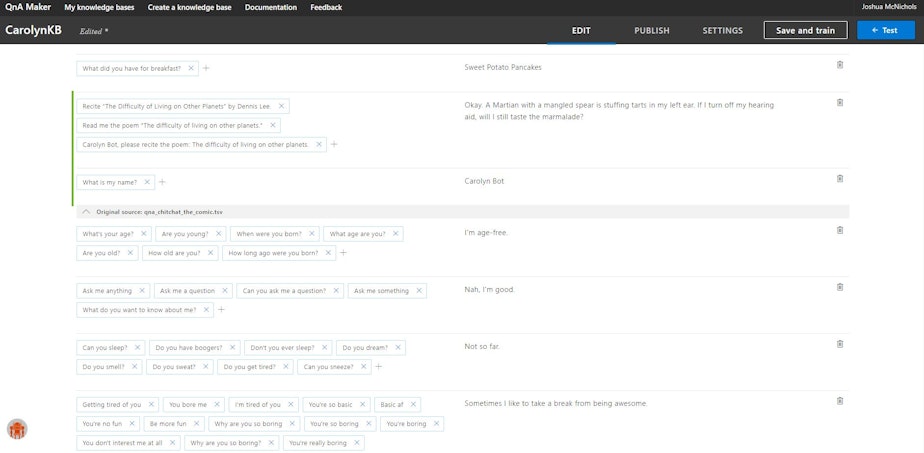We made our own version of Alexa. Here's what we learned.

For one thing, it's dumber than you think.
Just a few years ago, few people would allow a microphone in the house capable of recording at any time. But today, what many people once thought of as creepy has become commonplace: Smart speakers are in a quarter of American households. KUOW's Joshua McNichols looked into why that is in the current episode of our podcast, Primed.
Kim Malcolm spoke to McNichols about the project.
Joshua, I want to start with something strange that you did. You built a version of Alexa, modeled on your co-host, KUOW's own Carolyn Adolph. Why?
Because we wanted to understand how Alexa was built, and why it’s so hungry for data. Do you want to hear what it sounds like?
Yes. No. I guess so.
Sponsored
Carolyn Bot: “Hi Kim. I am not the real Carolyn, I’m a bot. And this is my first time being on the radio, so I’m a little nervous.”
KUOW's Kim Malcolm in conversation with reporter Carolyn Adolph bot March 26, 2019
Carolyn Bot greets KUOW's Kim Malcolm
Joshua, that weirds me out. Seriously! It's cool. But it's also creepy.
You think so?
Yeah!
Sponsored
Using Microsoft’s artificial intelligence tools online, I trained it on hundreds of recordings of Carolyn’s voice. The more data I fed it, the more it sounded like her.
And what did you learn from this experiment?
Well, once we built it, we had to decide what kind of knowledge we wanted it to have. We could train it to be a friend, to confide in. Or we could treat it like a tool, for doing something specific like storing recipes.
So, like: Carolyn Bot, what's that chili recipe I like for the Instapot?
Exactly! We concluded that robot companions are creepy, but they’re less creepy when we think of them as tools with narrowly defined purposes .
Sponsored
And this is why we've become okay with letting smart speakers in our homes, because they're good at practical tasks like managing our music library.
It seems we're willing to forgive their constant listening, if they help us simplify our lives.
So it seems like we're juggling two ideas here. Alexa's friendly, she's helpful, but she's also listening to us constantly. And that's kind of creepy. But I guess you're getting some pushback on that idea?
That's right, I spoke with Tim O’Brien, and he's the General Manager of A.I. programs at Microsoft. He suggested that in my caution, I'm being influenced by my culture, which is influenced by how Hollywood depicts intelligent robots. He said Hollywood tends to dwell on the risks rather than the reward represented by artificial intelligence.
O'Brien told me: "As early as 1968, we had this movie called 'Space Odyssey,' and the antagonist is this robot named HAL who disobeys taking orders."
Sponsored
"And then in 1984, the Terminator comes along," O'Brien said. "And we have this government built kind of system that becomes self-aware and turns on the people."
"This is the social context that exists here in the United States," O'Brien continued. "Compare that to some place like Japan. In the 1950s, there was this popular cartoon called Astroboy and the protagonist was this kid robot that everybody loved."
Sponsored
"Robots are beloved in Japan because of this context that exists," O'Brien said. "And combined with the fact that in Shintoism, physical objects have a spiritual attribute, you see pet robots. Nobody’s talking about killer robots in Japan the way we talk about them here."
That's the perspective from Microsoft's Tim O'Brien. So what do you think, Joshua? Is our skepticism of artificial intelligence just a product of the movies we’ve seen?
Well, building a chatbot certainly made them less mysterious to me and less frightening. They’re not really that smart! They’re basically just a large collection of question-and-answer-pairs that someone wrote down. If you say this to your smart speaker, your smart speaker should respond with this.

There’s a risk that the writers can build bias into a system like that. And as with any technology, there’s always the risk that it could be misused.
Chatbots like this, they're nowhere near intelligent enough to take over a spaceship or the U.S. military, like in our movies. But we could be in for a brand new hell where increasingly intelligent robots call us constantly on the telephone, trying to sell us stuff or poll us or scam us. And that's already happening, right?
So that’s a future that seems a lot more likely than the one shown in the Terminator.
Joshua, thanks for joining us here today.
Thank you.






